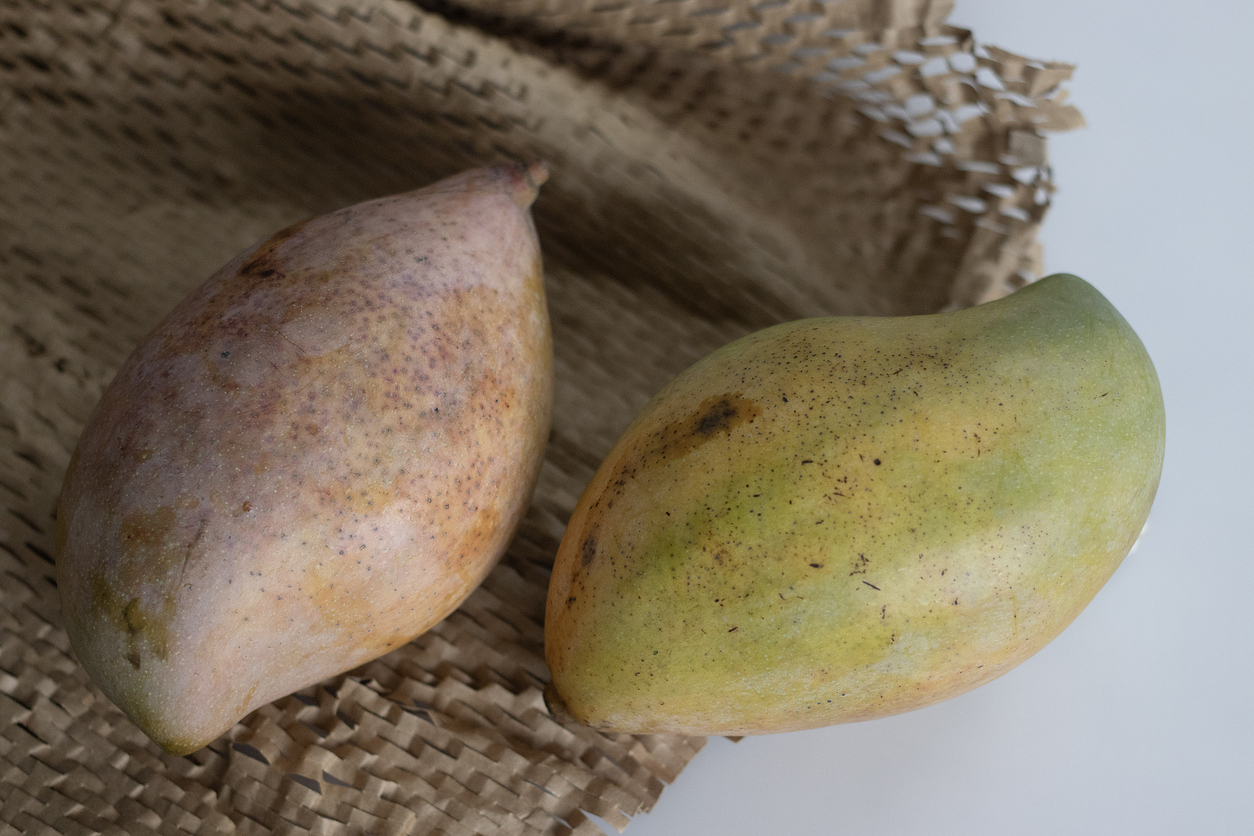Published Jul 14, 2025 | 11:00 AM ⚊ Updated Jul 14, 2025 | 11:00 AM

Fresh large Totapuri mangoes. (iStock)
Synopsis: The Andhra Pradesh government announced a support plan: pulp companies were advised to pay ₹8 per kg, with ₹4 borne by the companies and ₹4 provided as government subsidy. Despite this, many companies continued to pay only ₹4 to the farmers.
Mango farmers across Tamil Nadu are facing a steep price crash, sparking protests in several districts. Recently, mango farmers in Thiruvallur dumped their produce on the roads in protest, citing that they are not getting fair prices for their harvest.
Among the varieties hit hardest are Totapuri mangoes, also known locally as Bengalura mangoes, which are primarily used for mango pulp production. These varieties are typically procured in bulk by mango pulp manufacturing companies from farmers.
This price crash isn’t confined to Tamil Nadu alone. Mango growers in Andhra Pradesh and other states are also experiencing similar losses this year.
In Tamil Nadu, mangoes are primarily cultivated in districts like Thiruvallur, Dharmapuri, Krishnagiri, Salem, Tirupattur, and Vellore.
Popular mango varieties grown in these regions include Malgova, Alphonso, Imam Pasand, Salem Bengalura, Nadusalai, Banganapalli, Chakkarakatti, Rumaniya, Senthoora, Javvari, Kalapadi, and Rasalu.
While most of these varieties generally fetch stable prices, farmers overwhelmingly rely on Totapuri mangoes for bulk income, as they are the primary raw material for pulp-processing companies.
This year, however, Totapuri mangoes are fetching only ₹4 per kilogram in the market — and even that price has proven elusive for many growers, particularly those relying on pulp companies in Andhra Pradesh. Several farmers allege that the fruit has been left to rot on trees due to the lack of buyers.
In Thiruvallur and other areas bordering Andhra Pradesh, much of the mango harvest is usually sold to pulp manufacturers based in Andhra. Similarly, farmers in Krishnagiri, Dharmapuri, and Salem sell their mangoes to companies based in Hosur and Karnataka.
However, this year, mango pulp companies in Andhra and Karnataka have stated that they are unable to purchase more produce due to stockpiles from 2023. Andhra Pradesh local farmers told South First that companies had already scaled back procurement significantly. As a result, Totapuri mangoes were bought at just ₹4 per kg from Andhra farmers as well.
To mitigate farmer losses, the Andhra Pradesh government announced a support plan: pulp companies were advised to pay ₹8 per kg, with ₹4 borne by the companies and ₹4 provided as government subsidy. Despite this, many companies continued to pay only ₹4 to the farmers.
Thiruvallur farmer S Jayachandran says Tamil Nadu farmers have been largely ignored by these companies. “Unlike Andhra, the Tamil Nadu government has not announced any subsidy for mango farmers,” he said. “There is no official monitoring mechanism in place either to track mango yields or procurement.”
“Unless the government announces at least a seasonal compensation scheme for mango farmers, we cannot sustain this line of farming,” he added.
While farmers across Tamil Nadu are facing pricing issues, those in Salem are facing a double blow: poor prices and poor yield. “Rainfall during the flowering phase destroyed the crop,” said P Venkatasalapathi, a farmer from Kezhaiyur Maramangalam near Yercaud, Salem.
In Salem, mangoes are typically procured seasonally by pulp companies based in nearby Hosur. Beyond that, the major share of mango produce is sold at the local Salem market through commission agents, who export it to other states or districts, charging a 7% commission on sales. However, this season, Totapuri mangoes have witnessed a severe price crash. Coupled with poor yield due to untimely rain, the losses have deepened.
“All other mango varieties have also seen a sharp price drop, almost down to half. So, farmers are facing huge losses this year,” Venkatasalapathi added.
“All input costs considered, farmers spend up to ₹40,000 per acre for mango cultivation,” said G Sampath, district secretary of the All India Kisan Sabha in Thiruvallur. “When buyers refuse to pay fair rates during harvest, it completely destabilises our livelihood. We’ve demanded a compensation of ₹50,000 per acre from the government.”
He also points out that in mango-dense regions like Tiruttani, the government should consider establishing its own mango pulp manufacturing units to directly procure mangoes from farmers. “Only then can mango cultivation remain sustainable.”
According to Sampath, one key reason pulp companies have stopped procurement is the reduction in actual mango pulp content in juice products. “They’ve increasingly substituted pulp with chemicals, reducing the quality and hurting both consumer health and farmer livelihoods.”
This concern has reached the Union government. Tuticorin MP Kanimozhi Karunanidhi recently wrote to Union Minister for Food Processing Industries Chirag Paswan. “Mango farmers have been facing losses for the past few years due to reduced demand from beverage companies. The actual mango pulp content in drinks has dropped from 20% in 2022 to just 11% in 2024.”
“Fruit juices with more than 10% fruit content attract 28% GST — the same as carbonated drinks. To avoid this, companies have cut pulp content to fall under the lower 18% GST slab,” She attributed this to GST slab structures. As a result, they now label products as ‘fruit drinks’ or ‘fruit-based beverages’ — which only require 5–10% fruit content under regulations. This loophole is hurting mango farmers severely.”
She urged the Union Minister to take immediate corrective action. Tamil Nadu Chief Minister MK Stalin echoed these concerns in a letter to Prime Minister Narendra Modi, urging:
Mango farmers have made three key demands:

